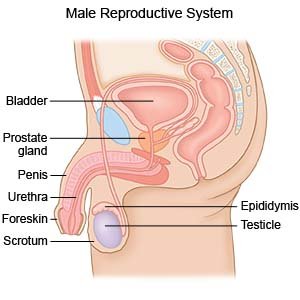Before Cryosurgery for Prostate Cancer
Medically reviewed by Drugs.com. Last updated on Aug 4, 2025.
AMBULATORY CARE:
Cryosurgery,
also called cryotherapy or cryoablation, is surgery to treat prostate cancer by freezing the prostate cancer cells. The prostate is a male sex gland that helps make semen.
 |
Call your doctor or surgeon if:
- You get a cold, the flu, or have a fever the day before, or the day of, your surgery.
- You have infected skin or a wound near the area where your surgery will be done.
- You have questions or concerns about your surgery.
Quit smoking before your surgery:
Nicotine and other chemicals in cigarettes and cigars can cause lung damage and increase your risk for new or returning cancer. Smoking may prevent healing and increase your risk for infection after your surgery. Ask your healthcare provider for information if you currently smoke and need help to quit. E-cigarettes or smokeless tobacco still contain nicotine. Talk to your healthcare provider before you use these products.
Eating and drinking before your surgery:
You may be on a clear liquid diet the day before your surgery. Clear liquids include juices without pulp, ginger-ale, water, and flavored ice. You may also need a suppository or enema the day before or the morning of your surgery. These medicines help empty your bowels. This may help prevent complications if your bowels or rectum are injured during surgery. Your healthcare provider may tell you not to eat or drink anything after midnight on the day of your surgery. You may be told you can have clear liquids up until 2 hours before your surgery.
Related medications
Medicines before your surgery:
Your healthcare provider will tell you which medicines to take or not take on the day of your surgery. Talk to your provider several days before your surgery about any medicines you take regularly:
- You may need to stop taking blood thinner, aspirin, or NSAID medicine several days before the surgery. This may prevent bleeding during and after your surgery.
- You may need to stop taking certain vitamins or herbal supplements several days before the surgery. Some vitamins and herbal supplements may increase your risk for bleeding and other complications.
- If you have diabetes, ask about your insulin. On the morning of your surgery, you may need to skip your dose or take a smaller dose. This will prevent your blood sugar level from going too low. Do not take your oral diabetic medicine on the morning of your surgery.
- Ask your healthcare provider if you should take your blood pressure or heart medicine before your surgery. Do not stop your medicine without talking to your healthcare provider.
- Take any medicine you were told to take with a sip of water on the morning of your surgery. Your healthcare provider may tell you to take ibuprofen a half hour before your surgery. When you arrive for your surgery, you may be given an antibiotic to decrease your risk for infection.
Arrange for someone to drive you home:
You may be able to go home after your surgery, or you may need to spend a night in the hospital. Arrange for someone to drive you home and stay with you for 24 hours after your surgery. You may need help doing things in your home, or someone to drive you to errands. Another person should stay with you so he or she can call 911 if you have complications from your surgery. You cannot drive for at least 24 hours.
Do pelvic floor exercises as directed:
Pelvic floor exercises squeeze your pelvic floor muscles and help them become stronger. To do pelvic floor exercises, squeeze your muscles like you want to stop urinating. Hold for 3 seconds and then relax. Pelvic exercises may prevent problems with urinating and having bowel movements after surgery.
Sexual activity:
After cryosurgery, you may have trouble having an erection. This is called erectile dysfunction (ED). These problems may not last long and most can be helped. Talk to your healthcare provider before surgery if you have any concerns about ED.
Activity after your surgery:
You will not be able to lift anything heavy for 72 hours after your surgery. Make arrangements to have someone help you at home. You may be able to return to work and exercise in 3 to 10 days. This will depend on the number and size of the incisions that are made by your healthcare provider during surgery. Your activity may also be limited if you go home with a urinary catheter.
© Copyright Merative 2025 Information is for End User's use only and may not be sold, redistributed or otherwise used for commercial purposes.
The above information is an educational aid only. It is not intended as medical advice for individual conditions or treatments. Talk to your doctor, nurse or pharmacist before following any medical regimen to see if it is safe and effective for you.
Learn more about Before Cryosurgery for Prostate Cancer
Care guides
Further information
Always consult your healthcare provider to ensure the information displayed on this page applies to your personal circumstances.
